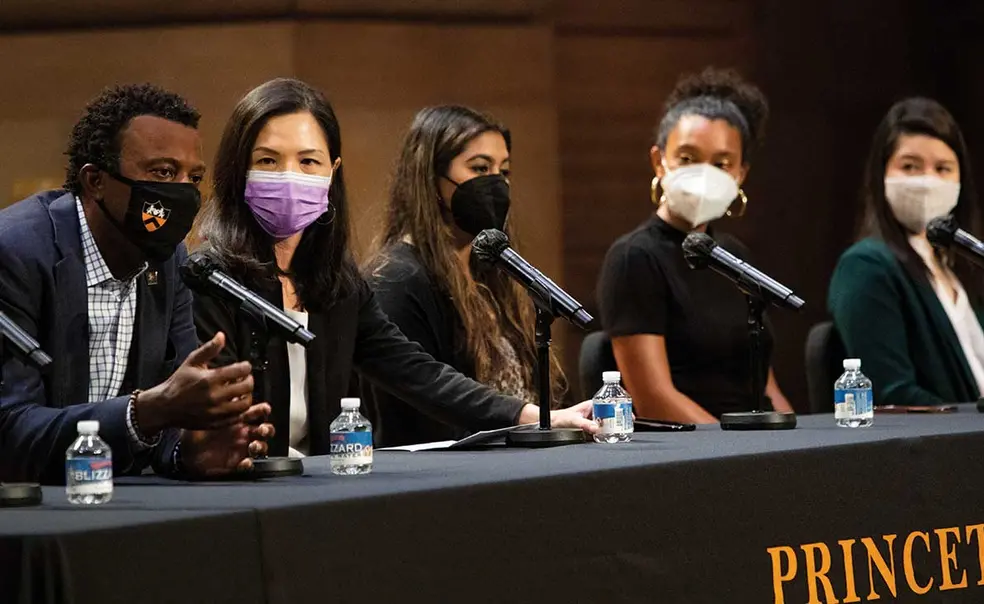Grad School Diversity Increases With Test Policy, New Programs
Two years ago, 14 graduate departments decided to make the GRE optional
Princeton welcomed its most diverse graduate class in the school’s history this academic year. Of the 675 incoming graduate students (436 Ph.D. and 239 master’s candidates), 24 percent are U.S. minority students. Another 39 percent are international students, representing 56 countries.
One factor that contributed to this outcome was a choice by some departments to stop requiring the GRE. Two years ago, 14 graduate departments decided to make the GRE optional to encourage broader diversity. The early data looks promising, said Cole Crittenden *05, acting dean of the graduate school.
“We saw that those 14 departments that did not require the GRE two years ago had a 58 percent increase in what we call underrepresented minority domestic applicants [students who self- identify as Black/African American, Latino/Hispanic, American Indian/Alaska Native, Native Hawaiian/other Pacific Islander, and/or multiracial],” he said. “Whereas the departments that didn’t change anything about their GRE requirements only saw a 2 percent increase year over year.”
The graduate school also saw an increase in applications from international students during the same time period, despite COVID travel restrictions. The GRE “can be a hurdle to international applicants,” Crittenden said.
Concerns around the equity of the exam led some institutions to begin dropping GRE requirements in 2018. Many more joined in 2020, including most of Princeton’s departments, because of the hurdles to testing created by the pandemic. For fall 2022 admission, only six areas of study are requiring the exam: civil and environmental engineering, economics, finance, politics, population studies, and the School of Public and International Affairs MPA and MPA/JD degree programs.
It is difficult to entirely credit the dropped GRE requirements for the record diversity numbers because the pandemic was a wild card, said Renita Miller, the graduate school’s associate dean for access, diversity, and inclusion. “However, it’s been nice because there was this huge spike in relation to the underrepresented minority population of candidates.”
The GRE is just one piece of the admission process, Miller said. The graduate school admission staff begins by sitting down with each of its 42 departments to discuss the candidates they’d like to see for the graduate degrees the school offers. While there are central requirements all applicants must meet, the other factors that determine admission vary by department.
In 2020–21, the graduate school had a 13 percent increase in applicants compared to the prior year, even though three departments (sociology, population studies, and religion) decided not to accept students due to the pandemic, Crittenden said. Many other departments decided to admit fewer students to allocate more resources to those already in the program.
Beyond testing requirements, the graduate school has also seen positive results from recent programs created for underrepresented students, Miller said. Graduate school representatives have connected with prospective students from more than 50 institutions through the Princeton Prospective Ph.D. Preview (P3), which began in 2018, to give those from underrepresented backgrounds an introduction to campus and support with the application process. The graduate school also does outreach and visits to HBCUs and other minority-serving institutions, and Princeton offers a one-year predoctoral fellowship for some areas of study (started as a pilot program in 2019–20) that helps incoming students from underrepresented backgrounds prepare for a full year before beginning their Ph.D. program.
For current students there are mentorship opportunities through the Diversity Fellows program, in which graduate students are hired to plan events to build community, and the Graduate Scholars program, which provides seminars on the transition to graduate school for predoctoral and first-year grad students, and pairs the students with a mentor who is a dean or staff member. These programs help students apply, get in, and see success at the University, Miller said. Participants become ambassadors for the graduate school and often have positive feedback to share with future prospective students, she added.
Department leaders also are thinking about diversity and the best ways to attract candidates. The psychology department, which was one of the 14 to drop the GRE in 2019, did see a rise in underrepresented and international students, said acting chair of psychology Betsy Levy Paluck. The department has shifted its attention to outreach, including through the P3 initiative, Paluck said. “We just want to keep encouraging a really big diversity of people to apply.”
But not all departments experienced a similar outcome. The geosciences department, which also dropped the exam in 2019, saw an increase in diversity the first year but a return to normal levels the second, said Blair Schoene, professor of geosciences and director of graduate studies for the department. The department also saw a drop in applicants overall and in applications from international students for fall 2021 admission, he added, and suspects this may have been due to the pandemic and visa issues.
Historically, geosciences and other natural sciences tend to have the lowest diversity stats compared to other sciences, Schoene added. The department is trying to explore why that is, while at the same time thinking about new approaches to its admission process to learn more about students.
“It’s hard to predict how successful a student will be based on their application,” Schoene said. “So, we’re trying to think of ways to more easily predict that.”












No responses yet